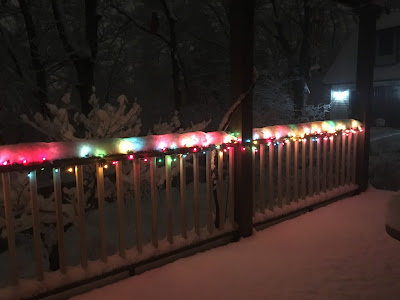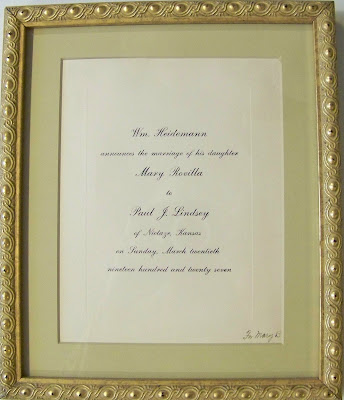around the upper & lower porch railings?I was planning all along to photograph the railing lights
-- which have been up since Christmas --
and then the Easter snowfall was an added bonus!
A Surprising Easter Evening Snowfall!
(Photos added April 1st ~
Nature's idea of an April Fools prank?)
"Shall we be a people who live in the darkness of denial and / or impotent rage? Or are we willing to step out and take the risk of believing, however humbly and lowly, in Christmas [and Easter] and that the little twinkling lights we see everywhere represent a great light?"The Rev. Nancy C. Tiederman,
friend, teacher, priest & spiritual advisor
A couple of years ago, I was regretting the misplacement of some long forgotten Easter poems (something about a steeple against an April sky "and I grew small again"; and another one about hearing church bells and the voice of God). Would I ever remember where I had filed them?
Amazingly yes! All three losses were restored to me, along with a bit of hope.
the church bells ring
I thought I heard
the voice of God."
Albert Schweitzer (1875 - 1965)
French-German Theologian & Renaissance Man
quotation found in
Quiet Thoughts: Reflections on the Meaning of Life
by Weaver & Whitley
"He was a rationalist,
but he had to confess that
he liked the ringing of
church bells."
Anton Chekhov (1860 – 1904)
Russian playwright and short-story writer
quotation found in
Women, Heroes, and a Frog
by Nina Leen (1909 - 1995)
Photo from my visit ~ October 2017
No Greater Heights
Eagerly,
I scanned the canvasses
of ancient masters -- drew forth
each hidden secret of their craft,
each principle of line, and form, and hue.
And I grew wise in Art.
Fervently,
I studied works
of great composers -- delved deep in melody
and mood, probed structure and technique.
And I grew wise in Music.
Avidly,
I thumbed through yellowed
manuscripts -- through ragged volumes, thick
with dust, and plied my mind with formulas
and rules.
And I grew wise in Science.
Philosophers and men of wit, I read --
plundered every single source
of knowledge, made captive all the learning
of all time until, I though
I towered in Wisdom over all.
And then I saw a steeple,
against an Easter dawn.
And I was small again.
Bernard S. Patrick (Copyright, 1954, John Deere)
poem found in Easter Ideals, 1964 (Vol 21, No 2)
Photograph taken by Ben McCartney ~ February 2018
Cathedral Cherry Blossoms ~ Washington, DC
Photograph taken by Ben McCartney ~ March 2004










































